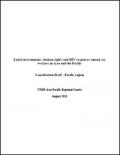Publications - Released in 2011
The report is intended to provide an evidence-base for: policy makers working in government, regional and multilateral organizations; parliamentarians; members of the judiciary; civil society organizations; donor agencies; and sex workers and their organisations engaged in advocacy to improve the legal and policy enabling environment for HIV responses. The first Asia and the Pacific Regional Consultation on HIV and Sex Work (2010) highlighted the need to document laws and enforcement practices so as to inform advocacy and programming to address the human rights of sex workers. The study focuses on 48 countries of the Asia Pacific region. The study method involves: review of legislation, cases, published research and grey literature; consultations with sex workers, technical experts and UN agencies; and analysis. This consultation draft relates to the Pacific region, Australian and New Zealand. Separate consultation reports have been prepared for the Asian regions.
The study focuses on laws and law enforcement practices affecting adults engaged in sex work. The study does not aim to map laws relating to children who are sexually exploited. Although the study considers the relevance of trafficking laws particularly as it affects adults voluntarily engaged in sex work, it does not map all trafficking legislation in detail.
Downloads
Organizations
- United Nations Development Programme (UNDP)






